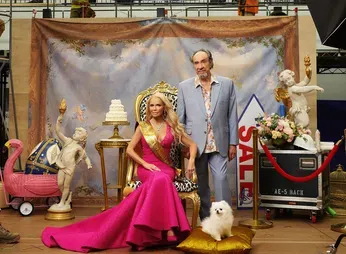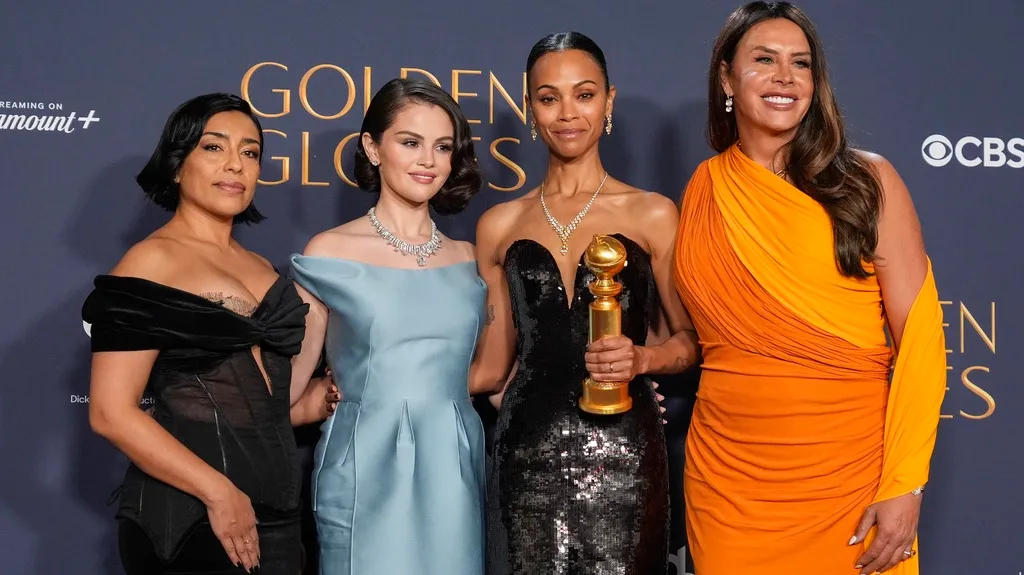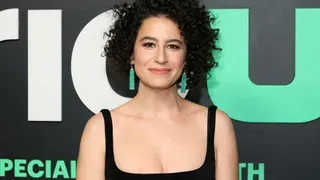
July 18, 2024
Director Michael Arden on Making 'Caviar Dreams' a Reality in Musical 'The Queen of Versailles'
Robert Nesti READ TIME: 10 MIN.
There isn't likely a better theater in the world for "The Queen of Versailles" to have its premiere in than the Boston's Emerson Colonial. The gilded, crimson interior has a rococo splendor that is reflected in the grand palazzo that billionaire David Siegel and his wife Jackie started building in nearly 20 years ago in Orlando, Florida. If it contained a theater, it would likely look like the Emerson Colonial. (The mansion, by the way, remains unfinished.)
The story of the building of their dream home, which they nicknamed Versailles, was the subject of Lauren Greenfield's remarkable 2012 documentary "The Queen of Versailles." More recently, composer/lyricist Stephen Schwartz ("Wicked") and librettist Lindsey Ferrentino ("Ugly Lies the Bone") used the documentary as a source for a new musical that shares the film's title and stars Kristin Chenoweth. It is having its world premiere at the Emerson Colonial under the direction of Tony-winning Michael Arden, who also had strong input in the musical's development.
EDGE recently had a phone conversation with Arden as he stood in an alcove in the lobby next to the iconic poster for "Follies," the Stephen Sondheim-Harold Prince collaboration that also had its world premiere at the theater some 53 years ago. At the moment, Arden was deep in tech rehearsals for the show. "Right now is that time when everything seems quite impossible," the Tony Award winner jokes. "But we're making the most of our time today and through the entire tech process. It is such a thrill to be working at the Colonial. It is such a beautiful theater with such an incredible history. And here I am with Kristin, F. Murray, Stephen. It is really thrilling. And there's no pressure. (Laughs). No, it is really thrilling to be able to work on a new musical. It is slightly based on a documentary, or inspired by a documentary; but it's very original. And that's rare these days to have the opportunity to make a big musical that's hopefully bold and daring."
But, he adds, this is just one step in the ongoing process of bringing this huge undertaking onto a stage. "We've had a lot of development so this production is the tip of the iceberg in terms of the work we've been doing for the past five years, writing it and going through workshop process. We're not relying on material that necessarily already has been tried and true. And we are trying to make sure that the audience has a clear and emotionally fulfilling experience as we tell our story. So I love it, because I have been part of creating that story as well."
In a very short time Arden has become one of Broadway's most-in demand directors after he helmed a trio of successful revivals. First in 2015 with Deaf West Theatre's "Spring Awakening," for which Arden received the first of three Tony nominations for Best Director. He received his second for "Once on This Island" in 2017. When that opened Jesse Green in the New York Times called it "ravishing," adding that you may not know Arden's name, "though if you saw Mr. Arden's reformulated 'Spring Awakening' for Deaf West Theater in 2015, you'd remember his signature. It's a big signature, maximally decorative and triply underlined." A colleague who saw the production said that Arden staging made him think the director was an heir to the late Harold Prince, which is about as great a compliment a theater director can get. When told that, Arden said it was as nice of a compliment that he could get and that "The Phantom of the Opera," Prince's most successful staging, inspired him to become a director.
The Prince connection turned up once more with Arden's next Broadway outing – the revival of "Parade," the Jason Robert Brown/Alfred Uhry musical that premiered in 1999 in a lavish Lincoln Center Theater production staged by Prince. Though it won Tony Awards for Brown and Uhry, the show was coolly received and never moved on from its limited run. But when the show was revived at New York's City Center under Arden's direction in November, 2022, it was so well-received that a Broadway transfer, with stars Ben Platt and Michaela Diamond, was in order. When it opened, amidst protests from ultra-Right groups, it became an immediate hit, selling out and, when the Tony Awards came around, winning Best Revival and Arden the award for Best Director. He also got cheers with his acceptance speech when calling out bigoted behavior noted that he had been called a "faggot" many times when he was a child, and that he was reclaiming the word.
@realmamabears Congrats to Michael Arden who won a Tony last night for his direction of the Broadway revival of the 1998 musical Parade, which is about the lynching of Leo Frank by an antisemitic mob. In his acceptance speech, Arden, who is gay, spoke to the queer community. "And to our beautiful trans, non-binary, queer youth, know that your queerness is what makes you beautiful and powerful. Everyone in this room sees you and needs you and will fight alongside you and we will win. Growing up, I was called the F-word more times than I can remember, and all I can say is that now I'm a f***** with a Tony."
♬ original sound - Mama Bears
"I really didn't get any flack for what I said," Arden recalls when asked if there was any negative pushback. "I think people actually enjoyed it. If there was anything negative, I didn't hear it."
The speech came about after Arden had walked in a park with a close friend, who is trans. "We usually spend our holidays together and I was asking if we were planning on spending Thanksgiving together. She said she was thinking of going home; but saw there are new laws in the state where her family is and she was scared she might arrested if she went to the women's room. I realized then I had to use my platform, if I had one, in that moment to speak up for someone and to let them know that they are not alone. And that was it. It became like immediately clear to me that if I had a minute on television, I needed to, I needed to use it for good."
Asked why "Parade" clicked a quarter century later, Arden says it has something to do with the rude awakening many Americans felt after Trump won in 2016. "When it came out, you know, it was the Clinton era, and I think everyone kind of believed, we've sort of moved past a lot of the prejudice the musical explores. That we had healed from a lot of our wounds in America. But along comes 2016 and where we've been since then, And I think it kind of we realized that all we did was put a bandage over those wounds. They weren't quite healed. So the revival came at a time when many Americans were re-examining our past and seeing things that didn't stick out when the musical was first staged. I also think that Harold Prince looked at the show as spectacle with an emphasis on the melodrama, but we took a more Brechtian approach."
For more on the National tour of "Parade," that launches in January, click here.

Source: Emilio Madrid
Arden came to "The Queen of Versailles" by chance when at a dinner sponsored by the Royal National Theatre, he sat next to playwright Lindsey Ferrentino, whose work he admired. "She complimented me on 'Spring Awakening,' and I suggested we work together on a musical," Arden recalled. "She said she had a crazy idea for one, and asked: 'Have you seen this documentary called 'The Queen of Versailles?' I immediately, like, grabbed her arm and said, 'Oh my God, I'm obsessed with that movie!' I had actually just watched it with my design partner, Dane Laffrey."
Arden remembered seeing the film when it came out and being impressed by its gaudy surface and darker probing into the American Dream. "Lauren Greenfield is a master storyteller and filmmaker. I think her interest in understanding America's relationship to money and consumption made the documentary all the more interesting. And Jackie is such a fabulous character."
Arden knew that to play Jackie on stage would take a fabulous actor, and he knew one with a personal connection with the show's composer/lyricist Stephen Schwartz. "I told Stephen this is a role we should make for Kristin. She was the first person I thought of when we discussed casting. She and I had been friends for quite a while, and been looking for project to work on together, much like Steven and I had. So I took her this idea, and she loved the idea."
Like its source, the show concentrates on the building of what was to be one of the biggest residences in the United States – an American Versailles. To do so Arden recruited his long-time design partner Dane Laffrey to bring the mammoth house (some 90,000 square feet) to the stage. "We have been working together since we were teenagers, and we really share our brain," he said. "I think that's the key to it is that we have to build it. That's not like we're presenting something that is finished. We're kind of looking at how something is built from from the ground up. You know, I think when you go to see a play, design is such a huge part of the experience of being there, and audiences are in for a real treat. This will be a real magical visual experience for an audience. The set is truly spectacular. It goes through several phases the mansion being built that you get to watch it on stage, just like you would if you were if you were there in Orlando."

Source: Michaelah Reynolds
√=Why the house remains unfinished to this day is a key to understanding the complexities of the story, which was called by director Greenfield a "rags to riches" story that became "rags to riches to rags" story. That comment annoyed David Siegel and the couple had a rift with Greenfield that has since melded. While the doc's director and the Siegels input into the musical has been minimal, The director in an interview last yearGreenfield described the film as a "morality tale," and hoped the musical would be the same. "Yes, that's what we are trying to do," Arden concurred. "I think it's a cautionary tale in many ways."
Arden also agreed with Greenfield about the show being about an addiction to consuming with Jackie at its most flagrant offender. "I think the other side of the coin of American Dream is this addiction to consumption. It is pretty much an American addiction. It is like we are taught it. It is ingrained in us to consume. And to try to reach the top of the mountain. It is about status, and once someone is there, it is all but impossible to stop wanting more and more. And the Siegels' story reflects that."
But what gave the documentary its heart was Jackie, who is far from a pretentious Real Housewife personality. A former beauty queen some thirty years younger than David, she is as likable reality show housewife the One-percent could ever produce. At one point, David describes his wife as "a psycho, but a lovable psycho. She does everything to the extreme." Humility proves to be Jackie's saving grace. In a story filled with ostentatious wealth - much of it, oddly, with Jackie as its center - she never appears to lose her upstate New York working class roots.
Making Jackie someone the audience can relate will likely be the key to the show's success, something that the collaborators are keen to make happen. Already the production has released a video of a song, called "Caviar Dreams" that establishes her character with a powerful
anthem of self-determination.
The song occurs early on after young Jackie watches an episode of "The Lifetime of the Rich and Famous" and climbs onto the roof to sing of her dreams. "It's a great song," says Arden. "And I think, like, what's great about it? You really root for quite immediately. In the film, when you meet her, she is already this fabulous and fabulously wealthy character, so she's fascinating, but emotionally remote. But we felt it is necessary to empathize with her as a person from the onset. That we see she comes from nothing and has these aspirations. She is up on her roof after watching 'Lifestyles of the Rich and Famous' with her family and she's dreaming of her better life. What isn't more relatable?"
Arden may not have much time to rest after "The Queen of Versailles" finishes its Boston run in August. Next up is "Maybe Happy Ending," a musical transfer from Korea set in the near future about a pair of helper robots who are outmoded and abandoned by their owners. A hit in Korea since it premiered in 2016, its English-language version won the 2017 Richard Rodgers Award by the American Academy of Arts and Letters. The one-acter is composed by Will Aronson, with lyrics written by Hue Park, and book written by both Aronson and Park. Arden directed its American premiere at the Atlanta's Alliance Theatre in 2020. The upcoming Broadway version is set to star Darren Criss and Helen J. Shen.
"Yes, the show is opening at the Belasco Theatre on Broadway in October, starting performances in September. It is a beautiful, beautiful musical by two guys named Hue Park and Will Aronson. And I'm really, really excited about it. It takes place in the future, and very different from "Queen of Versailles," but it's a beautiful show within a spectacular new score."
"The Queen of Versailles" continues at the Emerson Colonial Theatre, 106 Bolyston Street, Boston, MA through August 25, 2014. For more information, follow this link.
Robert Nesti can be reached at [email protected].







